- Home
- Nevil Shute
The Chequer Board Page 8
The Chequer Board Read online
Page 8
“Sam, here, he was ever so patient,” she said. “They was just doing it to be nasty, seemed to me.”
“I guess they don’t like to see colored people walking with English girls,” the Negro said quietly. “They wasn’t doing it to nobody except couples.”
Mr Frobisher sucked his pipe in thoughtful silence. “I dunno,” he said at last. “Funny sort of way o’ going on.”
He was genuinely concerned at the turn that events were taking in Trenarth. He was the unofficial leader of the community; the village had a decrepit village hall, an army hut of the last war put up by the British Legion, but the main meeting place and forum for discussion was the bar of the White Hart. Mr Frobisher had run that bar for very many years, and so had presided over most of the meetings of the village on topics that concerned them all. He felt, inarticulate, that it was up to him to take a lead in this distressing matter that was agitating the place. He was waiting upon events to show him what that lead should be.
Corporal Stanislaus Oszwiecki showed him, that same night. The bar was filled with sullen, irritated Negroes mixed with white soldiers. Corporal Oszwiecki thought this was a good time and place to give his views on the association of white girls with coloured men.
“Say,” he said, “you hear what the Snowdrops have been doing up ’n down the street?” He told his companions in a loud tone what had been going on. “Teach these English bitches to go walking with a nigger,” he said.
There was a momentary pause. Mr Frobisher broke it, from behind the bar. “Not so much o’ that language, if you please,” he said. “If you can’t talk clean, you can get outside.”
Jim Dakers said, “Say, what kind of a place is this, anyway? It makes me sick these English floosies go around with niggers. I seen them hugging and kissing in dark corners—think o’ that, man, hugging and kissing with a nigger!” He turned to Mr Frobisher. “Say, mister, this town stinks. Stinks of nigger.”
Three white American soldiers got up and walked out in silence.
Mr Frobisher slammed down a jug upon the counter. In the silence that followed the sharp rap he said, “If that’s the way of it, I’ll clear the bloody bar. Outside all the lot of you—white and black. Outside—every American soldier out of this house, unless you want the Military Police called in. Outside, all the lot of you!”
Corporal Oszwiecki said, “Say, what is this? We don’t have to go.”
Mr Frobisher left the bar and walked out into the street. Before the inn he found a couple of American Military Police. “There’s trouble with your soldiers in my bar,” he said. “You’d better get every American out of my house, white and black. They’ll be fighting with each other in a minute.”
The Military Police swung their truncheons and went in. In a few minutes the house was clear but for a few civilians and old Ezekiel Parsons sitting in a corner. In the quiet that followed the departure of the Americans the old man piped, “Nasty fellows, they white ones. I can’t a-bear them.”
Behind the bar Mr Frobisher sat grim and silent, writing the large letters of a placard on white cardboard, with a paintbrush dipped in ink.
It appeared in the bar window next morning. It read:
THIS HOUSE IS FOR ENGLISHMEN AND
COLOURED AMERICAN TROOPS ONLY
Two military policemen strolled up and looked at it. “Say,” said one, “that’s not right. The Colonel’s going to put out an order that the niggers use the refreshment room. This place is for whites.”
They stared at it in silence for a moment. “I guess it’s a mistake,” the other said. “The landlord’s a bit dumb. Look, he spelt ‘colored’ wrong.”
When Colonel McCulloch heard about the notice he knew that it was no mistake. He was down at the White Hart within half an hour. Outside the inn he paused and read the notice before going in. He found Mr Frobisher in his parlour, seated at the table, making out his orders.
“Say, Mr Frobisher,” he said, “I hear you had some trouble down here last night.”
“Aye,” said the landlord.
The Colonel said, “Well, that’s just too bad. It’s as I said, we’ve got to fix up separate accommodation. The only thing is, I want the white boys to use this place, as we settled yesterday.”
“Aye?” said Mr Frobisher. “Well, I don’t.”
“Say, what’s the matter with the white boys?”
The landlord thought deeply for a minute. “There’s nothing wrong with most o’ them,” he said at last. “Nine out of ten are quiet, decent lads, remarkable like us. The rest of them are kind of quarrelsome and always making trouble. You can’t say you’ll have one lot o’ white soldiers and not the others, though; it’s all or none. I never had no trouble with the coloured boys, of any sort at all.”
The Colonel said, “When you say the white boys, ten per cent of them, make trouble, Mr Frobisher, what do you mean? What sort of trouble?”
The landlord said, “Last night they was picking on the coloured boys—saying nasty things about ‘niggers’ in their hearing, and that. It was all the whites doing it, never the black boys. I think they was out to make a fight, that’s why I cleared the lot o’ them out.” He turned to the Colonel. “Some of the whites with foreign names don’t seem to like anything—nothing you can do will please ’em. They don’t like our girls, they don’t like the coloured boys, they don’t like the beer, they don’t like the lavatories, ’n they don’t like the English people, either, I don’t think. And they don’t mind telling you about it.…”
“Some of them may have a lot to learn,” said Colonel McCulloch. “Quite a lot of them have never been outside the States before.” He had not himself, but he did not say so.
“Aye,” said Mr Frobisher. “Well, they can go and do their learning up at the refreshment room, ’n come back to this house when they’ve learned how to behave.”
“Now that’s what I’ve come down to talk about,” the Colonel said. “We can’t have that. We can’t give this place over to the colored boys and let the white boys go up to the station. That’s giving the best accommodation to the niggers. You must see that we can’t do that.”
“I don’t know nothing about that,” said Mr Frobisher. “You’ve got your troubles, and I’ve got mine. I got my licence to think of, that’s what I’ve got—my licence. If I have fights and that, where do you think I’ll be? Why,” he said, “I bloody near had a fight with one of your white boys myself last night when he calls my Bessie a bitch. If I’d been twenty years younger I would ha’ done, licence or no licence.” He thought for a moment. “I’m sorry for the rest of your white boys,” he said—“the quiet easy ones that don’t feel badly about your black lads. But they just got to keep out of this house along with the others. I can’t separate ’em out.”
“How would it be, though, if the whites came here and we send the blacks up to the station? That’s the way we want it,” said the Colonel.
“Have that corporal with the foreign name in my house again? Not likely,” said the landlord. “I’ll take the blacks.”
Colonel McCulloch could not make him alter that decision and returned ruefully to the camp up on the hill to take the matter up in correspondence with his general. The notice stayed in the window.
That evening Mr Frobisher refused to serve white soldiers at all; as the barroom was crowded with pleased and jubilant Negroes, there was not the trouble that he had anticipated. The White Hart became firmly established as the recreation centre of the coloured soldiers, the white troops had to go to the small, ill-lit, badly furnished waiting room, and relations between white and black deteriorated rapidly.
It was at this time of tension that Dave Lesurier made his pass at Grace Trefusis. For some time now he had thought of little else but Grace. It was clear to all the Negroes that they would not be much longer in Trenarth. If Dave were ever to consolidate with Grace, he would have to get on with it; he had no time for the long courtship that he knew, instinctively, would be the right approach. He had been
courting Grace now for a month, and he had still got no further than, “Ten Players, please, ma’am.”
For a week he had been trying to advance to his next stage, which was “Say, Miss Grace, would you care to take a little walk one evening?” But he had been unfortunate; each time the shop had been full of other people and the girl had herself been busy, though not too busy to smile as she handed him his cigarettes. He knew that she would not agree to walk out with him if other people were in hearing; he would have to wait his chance to say his piece until they were alone together. And he got no chance.
Grace lived with her parents in a cottage near the railway; her father was a signalman at the junction box.
Standing about in the square one evening at about six o’clock, hoping for a glimpse of her, Dave saw her going with a friend down to the Village Hall; she recognized him, and smiled at him as she passed. It was sufficient to keep him rooted there for four hours till, in the moonlight, at about ten o’clock in the evening, she came out on her way home. And she came alone.
He crossed the road, and met her in a quiet corner by the gate that led into the yard of the White Hart. He was repeating his line to himself as he crossed the road, because he was very nervous—“Say, Miss Grace, would you care to take a little walk one evening?” But when he was face to face with her at the quiet corner he forgot his words.
He stood in front of her, and said, “Say, Miss Grace, …” And then he stopped.
She said, “Oh, it’s you.” She smiled at him, a little nervously.
He said again, “Say, Miss Grace, …” And then he stopped again, because it suddenly seemed silly to ask her to take a little walk with him one evening, at ten o’clock at night. And because he was uncertain what to do, and because he had to do something, he put his arms round her and kissed her.
For a moment she yielded, too surprised to do anything else. For a moment he thought that it was going to be all right. Then fear came to her, irrational, stark fear. When she was a little child somebody had given her a golliwog, a black doll with staring white eyes and black curly hair, dressed in a blue coat with red trousers. It had terrified her. Whenever she saw it she had screamed with fright so that it had been given to a less sensitive child. Now at the age of seventeen the same stark fear came back to her. What she had been subconsciously afraid of all her life had happened. The golliwog had got her.
She started to struggle madly in Dave’s arms, to free herself. She cried, “Let me go, you beast. Let me go.” And she cried quite loud.
Chagrined, and already ashamed, he released her. He said, “Say, I didn’t mean … Miss Grace, I guess I did wrong …” But she was gone, half running, sobbing with emotion and with fright.
At the corner she ran full tilt into Sergeant Burton, of Montgomery, Alabama, and of the U. S. Military Police, who had heard her cry out and was coming to investigate.
He said, “Say, lady, what’s the matter?”
He was fat and forty and comfortable—and white. To her at that moment he was all security. She sobbed, “There was a nigger there. He caught me and started messing me about.”
Sergeant Burton said, “These goddam niggers!” and blew his whistle. He shot around the corner with surprising agility for so large a man, still whistling as he went. As Grace stood for a moment slowly composing herself, two other Military Police shot past her, heading for the whistle. A jeep came screaming down the road in intermediate gear, driven by a third. With a screech of tyres it braked to a standstill beside her, and two more policemen tumbled out.
The girl was comforted by all this evidence of support, and yet at the same time she was distressed. She had started something and she didn’t quite know what. Around the corner there were men shouting, and then one re-appeared and whistled again. Men came pouring out of the White Hart. American soldiers, white and black, appeared from everywhere. Grace turned from them, still weeping a little, and walked quickly up the street towards her home. She could not bear to be questioned about what had happened.
Around the corner Dave Lesurier had to act quickly. He was bitterly chagrined and disappointed at the blunder he had made. As he heard what Grace had said to the sergeant, he realised that he was in a very serious position. He came, if not from the deep South, from far enough south, and all his youth had been conditioned by tales he had heard of Negroes being lynched and murdered horribly because the whites believed they had assaulted white women. Most of the tales that had conditioned him were quite untrue because such things grow in the telling, but Dave Lesurier could hardly be expected to know that. To him, at the moment, there was real danger that if the mob got him, a bonfire would be made outside the White Hart and he would be burned on it alive. He must get the hell out of there.
He dived into the yard behind him and flung himself over the wall into Mrs Higgins’s back garden; over the next wall into Polherring’s timber yard; from there he gained the back alley, and looked cautiously around. There was a clamour in the direction from which he had come, but they did not seem to be following him. He heard continuous whistling, and the sound of jeeps. And then, to his dismay, he heard shouted orders sending all American troops back to their camps.
He knew that he must rejoin them immediately and go back to camp with the crowd. He had not heard Grace tell his name; he did not know if she even knew it. If he could catch up with the crowd and mingle in with them he might escape; to stay in Trenarth and go back alone later meant instant detection. It never occurred to him for one moment to walk out and give himself up and tell the truth, that he had given the girl a kiss, so what? He had not hurt her, and he had not meant to hurt her, but it never crossed his mind that anybody would believe him if he said so. He must get the hell out of it.
He edged along the alley towards the end that led into Sheep Street; from there he could gain the High Street and mix in with the crowd. When he was still in the alley he heard voices of men in the street twenty yards ahead of him. He ducked back into the deep shadow of a wall as two corporals of the Military Police ran up, stopped, and peered down the alley towards him. He crouched deeper in the shadow.
One said, “Block this one—you stay right here, and block this one, and keep a lookout up ’n down this street. I’m going on around the block. We got him somewhere in this block.”
“What’s he done, anyway?”
“Raped one of these darned English girls.”
“Gee! They’ve had it coming to them. Is he armed?”
“I guess not. Might be, though. If he don’t stop on a challenge, better let him have it.” He ran on.
Peering out of the deep shade, the Negro saw the policeman at the end of the alley pull out his service automatic and cock it, to bring a cartridge to the breech; he moved close to the wall and stood there, vigilant, alert, the gun ready in his hand.
Very gently, inch by inch, Lesurier moved back along the alley, keeping flat against the wall in the darkness of the shadow, testing each step on the ground before he let his weight on that foot in case of noise, feeling ahead of him, with outstretched fingertips. The moon was with him, its bright light dazzling the watching policeman twenty yards away. The Negro moved back undetected.
Presently he came to a gate leading into a garden behind him. His fingers explored it and it opened. In quick silence he was through and out of sight of the watcher at the end of the alley. Now he could hurry. He sped over the walls, back into the timber yard, one side of which adjoined the High Street. Creeping over the timber, he looked down into the street.
There were no soldiers to be seen, except the Military Police. Under the direction of Lieutenant Anderson they seemed to be searching houses round about the White Hart. There was a picket of two policemen fifty yards away down the street in the direction of Penzance, at the corner of Sheep Street; at the moment they were looking up that street, where something seemed to be going on.
Deserted in the street, not ten yards from where he lay on the stacked timber, there was a jeep. It stood pointi
ng in the direction of Penzance.
Lesurier thought quickly, fighting down the panic that was overwhelming him. Although the troops were all out of the village, they could not yet have got back to the camp up at the airfield, over a mile away. If he could get the jeep out of the town, there was still a chance that he could catch up with the crowd and pass in with them through the guard, unidentified. If he could drive out on the Penzance road, there was a chance that he could work his way round through the lanes and reach the camp in time. There was the jeep, and only two policemen at the corner fifty yards away to pass.
He took a final glance around. Then he got down from the timber and strolled nonchalantly out into the street and got into the jeep. The noise of the starter made the two men turn towards him, but the light was bad and they could not distinguish the colour of the driver. Lesurier put the jeep in gear and accelerated towards them in a normal getaway, not too fast in order not to rouse suspicion.
He was only a few yards off them when they saw that it was driven by a Negro, and challenged. He jammed his foot down hard in intermediate gear and drove straight at them. They leaped to one side as he roared past; then he was driving as he had never driven a jeep before, jinking and swerving all across the street. Behind him whistles shrilled and a shot rang out, missing him by twenty feet. Then he was out of Trenarth, roaring down the road towards Penzance, four miles away.
He did not know the roads. He was a bulldozer driver, and had never driven much about the countryside, though he could handle the jeep well enough. He had thought there would be a lane leading off towards the camp, and he drove on desperately, looking for it. But there was no lane. He flung a glance behind him, over his shoulder, and there were the headlights of cars, many cars, streaming down the road half a mile behind him. They were after him, and the hunt was up.

 On the Beach
On the Beach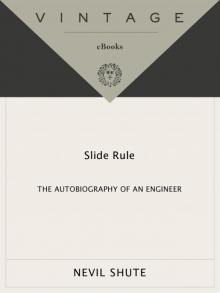 Slide Rule
Slide Rule A Town Like Alice
A Town Like Alice The Far Country
The Far Country Pied Piper
Pied Piper Round the Bend
Round the Bend An Old Captivity
An Old Captivity Mysterious Aviator
Mysterious Aviator The Breaking Wave
The Breaking Wave Marazan
Marazan Lonely Road
Lonely Road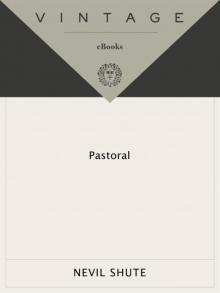 Pastoral
Pastoral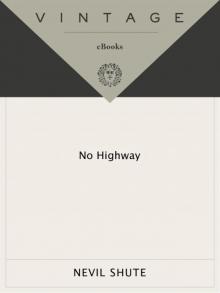 No Highway
No Highway Stephen Morris and Pilotage
Stephen Morris and Pilotage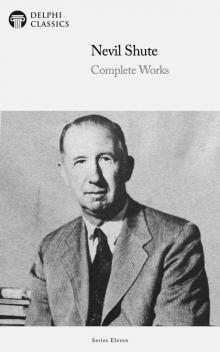 Complete Works of Nevil Shute
Complete Works of Nevil Shute Most Secret
Most Secret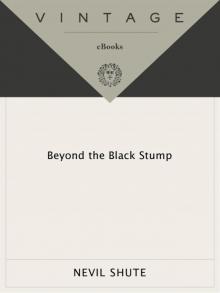 Beyond the Black Stump
Beyond the Black Stump The Rainbow and the Rose
The Rainbow and the Rose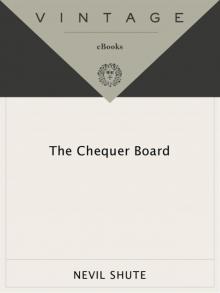 The Chequer Board
The Chequer Board Trustee From the Toolroom
Trustee From the Toolroom Ordeal
Ordeal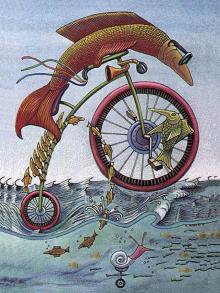 Stephen Morris
Stephen Morris